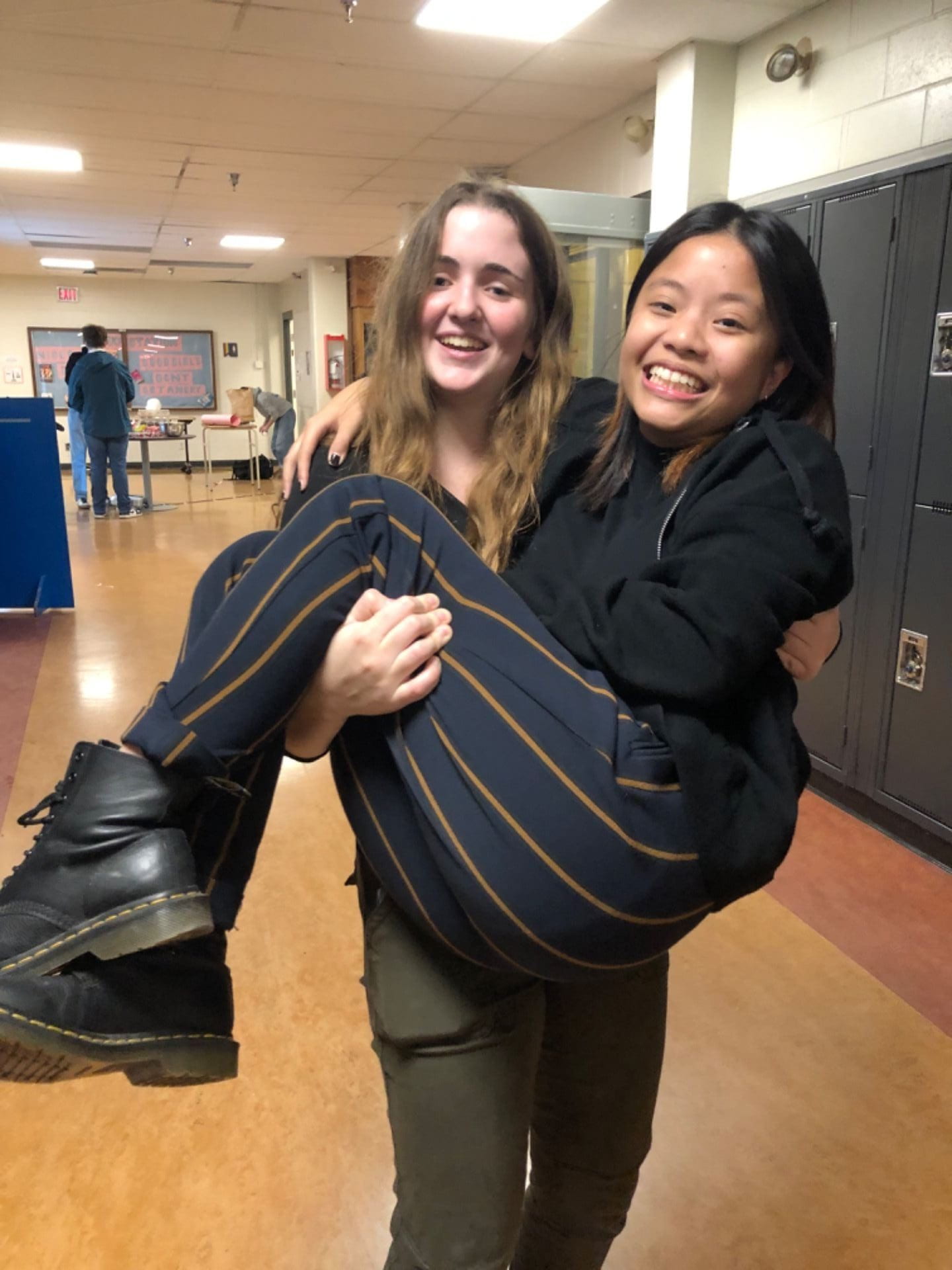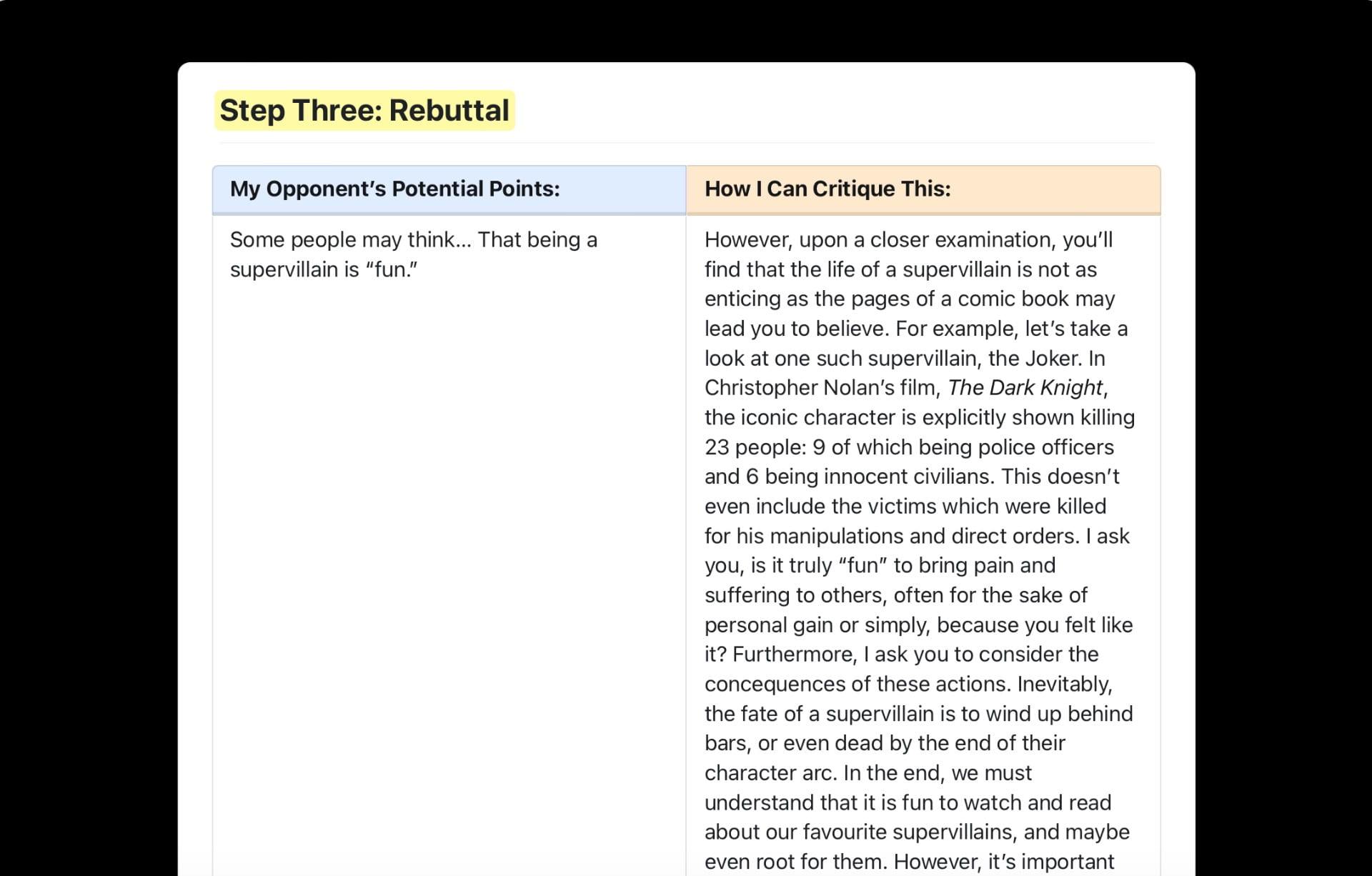Driving Question
“How can we use a formal debate to convince an audience we’re right?”
What does it mean to be a superhero?
A cape. A mask. A secret identity.
…Or is it more than that?
I thought I knew the answer when we decided on “being a supervillain is better than being the hero” as our debate topic for this year’s exhibition.
But when I opened the document, hovered my fingers over the keyboard, and glared at the blank screen, I realized No.
No I didn’t.
Little did I know that “fun topic” Faith and I had chosen, wasn’t so fun after all… (at least, it didn’t seem like it was at first.)
After binge watching the entire Dark Knight trilogy (plus an additional 2 other Batman films just because I was on a roll), I’m back from the winter break and ready to share a [traumatic] recap of the past month.

What is debate?
We began this project by watching the film “The Great Debaters.”
The movie was influenced by the true story of the Wiley College debate team in 1935 Texas, exploring how debate can be used to empower marginalized communities and challenge social norms.

This film introduced how debates actually work (at least, in a dramatized sense.) Turns out it’s a whole lot more than just reading out to an audience. There’s researching, developing good points, planning for rebuttal, and a whole lot of practicing. As much as it’s about what you’re saying, you also have to say it in a compelling and clear way.
Honestly, I was terrified when I found out we were doing debates. I owe most of my public speaking knowledge to all the years of speech arts I had to do in elementary, and I wasn’t sure how well that’d hold up.
Anyways, after listening to other people’s debates, it was about time we try to write our own. For practice, we worked on a short write up to sharpen our persuasive writing skills.
I wrote mine on socks and why they’re the best ever (because they obviously are.)

Although I had a lot of fun with my paragraph, it seemed like it was more of an advertisement than a debate speech. In my second draft, I tried to fix this through citing my sources and focusing more on the evidence.

Finally, for the last copy, I added some parallel structure, repetition, and other writing techniques to try to engage my audience. I attempted to emphasize the catchy lines, without it sounding too much like an advertisement this time around.

Using the experience I gained from this assignment, I was ready to begin my case.
I think the hardest part of this project was figuring out how exactly I was going to do this! I didn’t have much experience with debating (besides Revolutions on Trial back in Grade 9!) What kind of a stance was I going to take? Where do I start?
Surely, I had a ton of ideas, but how was I going to organize them all? Prove them all? How was I going to back up superheroes with reliable sources?

I think my biggest mistake was researching without purpose. I went through many sources, but I didn’t exactly have a thesis that I was trying to prove. From examining the story structure of Homer’s “Odyssey”, scrolling through questionable Reddit forums, and psychoanalyzing the Joker, I was all over the place.
When I created my bibliography, I think I was beginning to develop an idea of what my case would be, but it wasn’t finalized. I actually found myself returning to the researching phase later on.
If there is a next time, I would definitely try to define my case as quickly as possible, so that I know what I was looking for when I research.
(Click to Read)
I also struggled with this as I began my first draft. Now, I had points, but the speech felt more like a “Ted Talk”, focusing more on history, facts, and entertainment rather than actually convincing the audience.
As we transitioned into improving our speeches, we also began planning our rebuttal. Although I would later struggle with my rebuttal during the actual debate, I found that this step really improved my argument.
By diving into the affirmative, I realized that I didn’t just need to define the supervillain, but rather, understand them. In comparing superheroes and supervillains, we were essentially bringing up the classic “good vs evil” debate. If I knew what made the villain, then I could recognize why the hero is better.
I also found a novel (written by a dude with a PhD!) that dove into the philosophy of villains, single-handedly reviving my argument back from the dead. I even found some interesting quotes from famous philosophers. However, I’m sad I struggled to incorporate them during the debate.
(Click to Read!)
In reflection, I am disappointed with how I did my rebuttal. Even with all the preparation and thought I put into planning it, I still struggled with saying them on the spot (and having them apply to my opponent’s argument.)
I’m definitely not a “thinking on my feet” kind of person, and I value time to contemplate my ideas/ articulate my thoughts. I often find myself with intriguing ideas, but with no idea how to transfer them out of my brain. Even if I didn’t do as well as I wanted to, I came out of this project with experience so that hopefully next time I get tangled in a debate, I’ll know how to do it better.
Coming back to my speech, now that I had a better idea of what my argument would be, it was much easier to write.
…Maybe too easy, because I was… a little… over the word limit.

Haha… oh no.
(Just to let you know, the time limit was 4 minutes…)
There was just so much to say and so many ideas, that I had trouble cutting it all down. I was able to make the limit in the end, but this was such an interesting topic that I would’ve liked some more time to delve into other ideas (ie: why we want to be good, comparison with superheroes, more examples from media, etc)
Here’s my final speech:
(Click to Read!)
…And now, it was time for the exhibition.
 (My opponent… my nemesis, Faith… and my good friend Ariane… because I just now realized I didn’t have any other photos from the exhibition…)
(My opponent… my nemesis, Faith… and my good friend Ariane… because I just now realized I didn’t have any other photos from the exhibition…)
I was terrified. Petrified. Alarmed! INTIMIDATED!
*Looks up synonyms of scared

IN A BLUE FUNK!
I was so jittery, I couldn’t stand still. But what was the source of all my fear?
Public speaking.
As I mentioned earlier, I did a lot of public speaking in elementary school and with all the times I had to do it in PLP, I should be confident, right? Nope. And you would think it would get easier after all these years-
There was also the threat of speaking on the spot with the rebuttal, which I had never really done before. (With the exception of that one time in like grade 9 when my group debated the importance of the Phoenician language AND WON slam dunk …but that doesn’t count, because it was a group effort.)
See what I’m trying to say with this abnormally long description is that it was hard. Probably one of the hardest projects I’ve ever done in PLP… Standing before the podium and blabbing about comic book characters.
Though it can sound silly, and at times, it very much is… I also believe that it was important. And not just for my own learning. Taking the time to appreciate and value different perspectives, especially in a time where the world is so divided, is important. Debate is a way of sparking change in a respectful, logical, academic manner. It is a way of encouraging understanding, and paving the way for a brighter future. One that values facing our own bias and supporting argument with evidence.
Driving Question
“How can we use a formal debate to convince an audience we’re right?”
I didn’t win the debate, so I can’t really say I convinced an audience I’m right. But, no matter what happened, I’m so proud that I did it. Even though my every instinct was screaming at me to run off that stage and my voice was cracking so badly that I was fighting to say every word, I’m so happy I did it.
It took a lot of work, a lot of brain cells, and a lot of time. But it was worth it. There’s a lot of things I could have done better, but that’s what happens when you try something new. It’s “First Attempt In Learning”, after all.
Most of all, I’m very happy that I get to sit on the same side of the class as Faith again. And we’re officially no longer nemesises 😎
I want to end this blog post with an excerpt from my speech, because I think it’s pretty rad and I feel big brained having written it, so I want people to read it:
“Supervillains are designed to be entertaining.
They exist for our enjoyment. Captivating us with cunning schemes, intriguing personas, and diabolical plans. We await their every move, relishing in the excitement of their evildoings. So much, that we’re often left to forget what they truly are.
Villains are tragic. They exist as a reminder of what happens when we forget who we are. You can root for a supervillain, you can enjoy their chaotic freedom, silly costumes, and devastating backstories.
However, that doesn’t mean being in their shoes is something anyone would want.
At the end of the day, we can leave the theatre. We can close the book. But these characters can’t.
This is the real world. And this life you’re living each and every day is YOUR story. Who do you want to be in your own story?
Be the hero.”








January 10, 2024 at 4:56 AM
Hello there Ava!
Your debate was wildly entertaining. I am honoured to be featured in your blog post, alongside your big brain.
Your friend,
Ariane